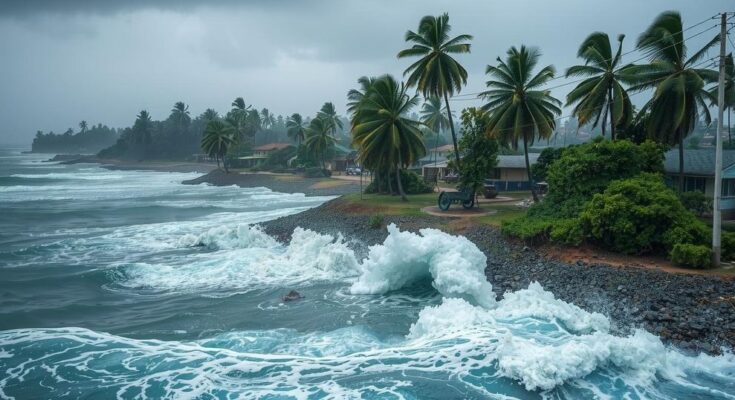At least 34 fatalities and 43 injuries were reported following Cyclone Chido’s strike on northern Mozambique, impacting approximately 2.5 million people. The cyclone caused severe destruction, especially in Cabo Delgado province, with total damage to numerous homes and infrastructure. As the region continues to recover, experts warn of potential increases in such climate-related disasters due to global warming and changing weather patterns.
Cyclone Chido has wreaked havoc across northern Mozambique, resulting in the loss of at least 34 lives and leaving 43 individuals injured. The disaster occurred on Sunday and Monday, primarily impacting the provinces of Cabo Delgado and Niassa. Initial reports from Luisa Meque, the chair of Mozambique’s National Institute for Disaster Risk Management and Reduction, suggest around 2.5 million people are currently affected by the cyclone’s extensive damage. The hardest-hit area, particularly the capital of Cabo Delgado, Pemba, has experienced near-total destruction, with Mecufi sustaining utterly devastated infrastructure.
Survivors recounted harrowing experiences, such as Canjar Amade, who described the cyclone demolishing his home and leaving him vulnerable during the storm. Amidst these efforts, meteorological experts have indicated that remnants of Cyclone Chido continue to impact various regions, bringing sustained rains and strong winds. The cyclone, which also influenced weather systems in Malawi and Mayotte, is projected to dissipate near Zimbabwe by late Tuesday. Mozambique’s geographical reality makes it exceedingly susceptible to the ramifications of climate change, with the rainy season from October to April being marked by a recurring cycle of floods and cyclones.
Mozambique ranks among the nations most adversely affected by the consequences of climate change, facing recurring tropical cyclones and flooding during its rainy season. The current situation underscores the extreme vulnerability of the region to natural disasters, exacerbated by changing climate conditions. The anticipated La Nina effect projected for early 2025 indicates that southern Africa, including Mozambique, may experience an increase in the frequency and intensity of storms and flooding, posing significant risks to already drought-stricken areas.
The devastation caused by Cyclone Chido highlights the urgent need for enhanced disaster preparedness and response strategies in Mozambique. With millions already affected and the cycle of climate-related disasters expected to intensify, comprehensive measures are imperative to mitigate future impacts. Continued attention from both national and international communities is essential to address the humanitarian needs arising from these natural calamities and to bolster resilience against future climate adversities.
Original Source: www.voanews.com




